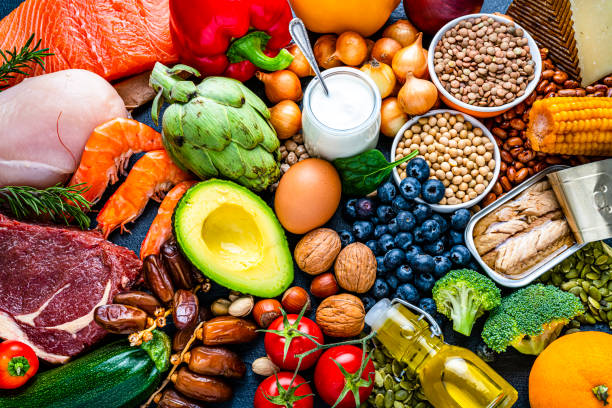I. Introduction: Why Meal Prepping is the Optimal Solution for Professionals
1. The Fast Pace of Life and Nutritional Challenges
In our modern world, where the pace of work accelerates and the demands of professional life increase, many professionals find themselves in a constant race against time. This rapid pace, unfortunately, often comes at the expense of one of the most important aspects of our lives: proper nutrition. With limited time, resorting to fast and unhealthy food options becomes the easiest and most common solution. These meals may seem like an immediate fix for hunger, but in the long run, they exact a heavy toll on health and productivity.
The continuous reliance on ready-made and processed meals leads to fluctuating energy levels, poor concentration, weight gain, and may even contribute to the development of chronic diseases. The successful professional understands that high productivity starts with good health, and the fuel they put into their body is just as important as the fuel they put into their car. This is where the role of meal prepping emerges as a smart and effective strategy.
2. Defining Meal Prep and Its Importance
Meal prepping is simply the process of planning and preparing meals in advance for a specific period, often a full week. It is not limited to cooking the entire meal; it may also include preparing basic ingredients such as chopping vegetables, cooking grains, or marinating proteins.
The importance of this practice for busy professionals lies in the fundamental benefits it offers:
Time Saving: Instead of spending an hour daily thinking and cooking, this effort is consolidated into one or two sessions per week. Nutritional Control: Meal prepping allows you complete control over the ingredients, including the amount of salt, sugar, and fat, ensuring you eat healthy food suitable for your dietary goals. Money Saving: It reduces spending on expensive restaurants and fast food, and helps use all purchased ingredients before they spoil. Stress Reduction: It removes the "What should I eat today?" decision from the daily equation, freeing up mental energy to focus on more important professional tasks.
II. The Golden Foundations for Successful Meal Prepping
Meal prepping is not just cooking; it is a system that requires careful planning. To ensure the success of this process, a set of golden foundations must be followed.
1. Smart Planning: The Key to Success
Successful meal prepping begins with planning. This planning must align with your nutritional goals and your schedule.
#### Defining Nutritional Goals
Before starting, ask yourself: What is my goal? Is it weight loss? Muscle building? Or simply maintaining sustained energy throughout the day? The answer will determine the type of ingredients and quantities you will need. For example, if the goal is muscle building, the focus should be on increasing protein portions.
#### Creating the Weekly Shopping List
Once the meals are determined, create an organized shopping list. Focus on ingredients that can be used in more than one meal to increase efficiency and reduce waste. For example, grilled chicken can be used in a lunch salad and a dinner sandwich.
#### Choosing the Prep Day
Designate a specific day of the week for the preparation process, often a weekend day (Friday, Saturday, or Sunday). Allocate two to three hours for this task. Treating it as a "mandatory meeting" in your schedule ensures commitment.
2. Essential Tools and Equipment
Investing in the right tools greatly facilitates the preparation process and makes it more enjoyable.
| Essential Tool | Description and Importance |
|---|---|
| :--- | :--- |
| <strong>Airtight Storage Containers</strong> | Essential for keeping food fresh. Glass containers are preferred for easy heating in the microwave or oven and because they do not react with food. |
| <strong>Large Cutting Board and Sharp Knives</strong> | To speed up the process of chopping vegetables and proteins. |
| <strong>Digital Food Scale</strong> | Essential for professionals following a precise diet who need to accurately measure portions. |
| <strong>Multiple Pots and Pans</strong> | To be able to cook several ingredients at once (e.g., rice in one pot, chicken in another). |
| <strong>Electric Pressure Cooker (Instant Pot)</strong> | Saves enormous time in cooking grains, legumes, and tough meats. |
III. Practical Strategies for Meal Prepping (Practical Tips)
There are two main approaches that the busy professional can adopt for meal prepping, and they can be combined to achieve maximum variety.
1. The Separate Components Strategy (Batch Cooking)
This strategy relies on cooking large quantities of basic components separately, and then assembling them into different meals daily. This method is ideal for those who quickly get bored of eating the same meal for several days.
How to Apply:
1. Protein: Grill or boil a large quantity of chicken, meat, or fish. 2. Complex Carbohydrates: Cook a large quantity of brown rice, quinoa, or sweet potatoes. 3. Vegetables: Chop vegetables in advance, and grill or steam a portion of them (like broccoli and carrots).
Example of Assembly: Grilled chicken can be used with quinoa and roasted vegetables on the first day, then on the second day, the chicken is chopped and added to a salad with fresh vegetables.
2. The Full Meal Prep Strategy
In this method, the entire meal is prepared and stored in individual portions ready for heating and consumption. This is the most time-saving method during workdays.
Examples of Quick Full Meal Preps:
Jar Salads: Dressing is placed at the bottom, followed by solid ingredients (like chickpeas and carrots), and then leafy greens on top. When serving, the salad is inverted into a bowl. Grain Bowls: Contain a base of grains (rice or quinoa), protein, and vegetables, and are ready for heating.
3. Smart Freezing Strategy
Freezing is the busy professional's friend. Many foods can be safely frozen for up to three months, ensuring "backup" meals for days when there is no time for preparation.
Excellent Foods for Freezing:
Soups and stews (like lentil soup or beef stew). Healthy baked goods (like oatmeal or banana muffins). Cooked proteins (like meatballs or shredded chicken).
Tip: Freeze meals in individual portions, and write the freezing date on the container. Food should be thawed in the refrigerator overnight before heating to ensure safety.
IV. Ideas for Quick and Nutritious Healthy Meals (Real-World Examples)
To motivate you to start, here are some practical ideas that can be easily prepared in advance.
1. Time-Saving Breakfast Meals
Breakfast is the meal that is often sacrificed due to time constraints.
Overnight Oats: Mix oats, milk (plant-based or regular), and chia seeds in a small container, and leave it in the refrigerator overnight. In the morning, add fruits and nuts. Baked Eggs in Muffin Tins: Whisk eggs with chopped vegetables (like spinach and bell peppers) and pour them into muffin tins and bake. They can be stored in the refrigerator and reheated in seconds.
2. Office Lunch Meals (Easy to Carry and Heat)
Lunch should be balanced to avoid feeling sluggish in the afternoon.
| Main Component | Protein | Complex Carbohydrates | Healthy Fats |
|---|---|---|---|
| :--- | :--- | :--- | :--- |
| <strong>Quinoa Salad</strong> | Chickpeas, lentils, or grilled chicken | Quinoa | Olive oil or avocado |
| <strong>Tortilla Wraps</strong> | Cottage cheese, tuna, or smoked turkey | Whole-wheat tortilla bread | Sunflower seeds or tahini sauce |
| <strong>Brown Rice Bowl</strong> | Lean ground beef | Brown rice | Nuts or seeds |
3. Light and Quick Dinner Meals
After a long workday, dinner should be quick to prepare and comforting.
Baked Salmon with Asparagus: Salmon and asparagus can be seasoned in advance, and in the evening, they are simply placed in the oven for only 15-20 minutes. Rich Lentil or Vegetable Soup: A large quantity of soup can be prepared and stored in the refrigerator or frozen. All you have to do is heat it up.
V. Overcoming Common Meal Prep Challenges
Even the most committed professionals may face challenges on their meal prep journey.
1. The Problem of Boredom and Variety
The biggest complaint about meal prepping is the boredom of eating the same food. The solution lies in smart variety.
Using Spices and Sauces: You can have the same basic components (chicken and rice), but changing the sauce and spices completely alters the flavor. Use an Asian sauce one day, a Mexican sauce on another, and a Mediterranean sauce on the third. Weekly Meal Rotation: Do not prepare the same meal for five consecutive days. Prepare two different meals for lunch and two for dinner, and alternate between them.
2. Maintaining Food Safety and Quality
Food safety is paramount, especially when storing food for several days.
Safe Storage Rules: Cooked food should be refrigerated within two hours of finishing cooking. Do not leave food at room temperature. Shelf Life: Most pre-prepared meals are safe to consume for 4 to 5 days when stored correctly in the refrigerator. If you plan for longer, the extra meals should be frozen. Leafy Greens: To keep leafy greens fresh, store them with a dry paper towel in an airtight container to absorb excess moisture.
3. Calorie and Macronutrient Tracking (Optional)
For professionals following a specific diet (such as weight loss or a sports regimen), meal prepping is the best way to ensure accuracy.
Measure Before Cooking: Weigh ingredients (like rice and chicken) before cooking them. Use Tracking Apps: Enter your prepared recipes into calorie tracking apps (like MyFitnessPal) once, and then easily log the meal daily. This saves enormous time compared to tracking each meal separately.
VI. Conclusion: An Investment in Health and Productivity
Healthy meal prepping for busy professionals is not just a dietary trend; it is a real investment in health, productivity, and overall well-being. It represents a shift from reaction (buying fast food when hungry) to proactive action (planning to ensure optimal nutrition).
We have seen that the key to success lies in smart planning, practical strategies like batch cooking, and overcoming the challenges of boredom by diversifying flavors. When you dedicate just a few hours of your weekend, you buy yourself valuable hours of work time during the week, and ensure your body and mind are operating at maximum efficiency.
A Message of Encouragement: You do not have to start by preparing all your week's meals at once. Start with a small step today. Choose just one meal (like lunch) and prepare it for two days. Once you master this step, gradually increase the number of meals. The discipline you gain in the kitchen will positively reflect on your discipline and success in your professional life. Start now, and enjoy the difference meal prepping will make in your busy life.



